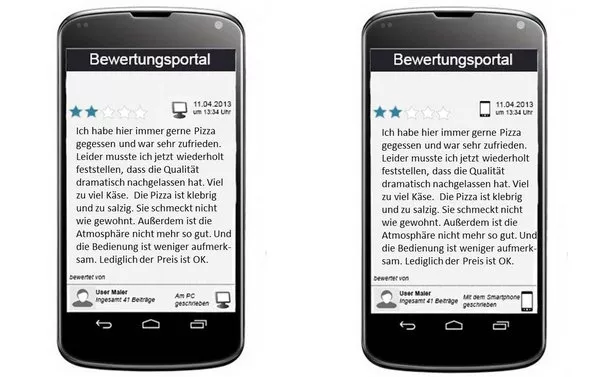Different behavior, different perseption, differentiated customer management
Starting situation
Smart phones have become established and omnipresent terminals of the daily internet use. This also changes customer behavior. Internet users act differently when using a smart phone than when using a PC. Despite rapid progress in the usability of modern smart phones, the convenience when entering text and the overview of information are more limited than with a keyboard and a larger screen. At the same time, a smart phone enables instant access to internet resources anywhere and anytime. The mobile customer often uses the internet "on the side", namely on the way to work, during a meeting, in a restaurant or on the sofa at home while watching TV. On a desktop or laptop, the customer seems to be more focused on his online activity. In addition to the technical differences, it is mainly these situational differences which characterize internet behavior. The characteristics and effects of mobile behavior are analyzed using the example of customer reviews of services.
Appropriate Management by Means of Intelligent CRM Systems
User-generated customer reviews of services are the crucial content of opinion and recommendation platforms such as Yelp or TripAdvisor. For the platform operators, it is decisive that a user group creates useful content, i.e. helpful reviews. They thus provide relevant information to a different user group - namely the one which is searching for a service. In this multi-lateral constellation, the reading user group forms an interesting target group for advertising clients as it apparently is in a purchase decision process and is actively looking for decision support. Platform operators have to manage these different customer and user groups (review writers, readers, and advertising clients) by means of intelligent CRM. As both the writers and the readers as non-paying customers cannot be evaluated by means of monetary transactions, other key parameters have to be considered, such as the quantity and quality of the articles. In the present study, both these criteria and the role the respective terminal plays in this process are taken into account. Because despite the omnipresence of smart phones (not only) in purchase decisions, this factor has not been taken into account in the previous research on customer reviews. The influence of customer reviews on purchase decisions has been sufficiently examined (e.g. by Zhu and Zhang, 2010); the same applies to the question of how a helpful customer review is characterized (e.g. by Scholz and Dorner, 2013). Thus, the question is: Does it make a difference if a customer review is written on a stationary or on a mobile device?
Solution Strategy
In order to develop an efficient CRM system, it is material to collect, merge and then analytically analyze and use relevant and significant data. In this case, the focus is on the user data and the evaluation of customer reviews. Good web analytic tools are able to allocate access to an online platform to a browser and an operating system and thus to mobile or stationary devices. It is more difficult to evaluate the quality of customer reviews. Indicators are 'helpful' evaluations of the reading users, numbers of page views and visibility in the search engines. Sentiment analysis and text mining tools help in order to better identify the criteria of relevance. Writing and access devices as well as text criteria have to be analytically connected in order to be able to forecast the relevance for the reader. The evaluating users have to be either further motivated or qualitatively "trained" by means of a differentiated campaign management. Depending on the situation, certain information may be more or less interesting to a reader: in one case, the customer searches in detail for a suitable restaurant for the evening using her PC, in another case she is already hungry, standing in a street and looking for a recommendation using her smart phone. The subsequent review of the service experience will also be different, depending on whether a user writes her review emotionally charged directly after the experience or after a certain period of time on the PC. The actual specifics of the situation can hardly be captured. Writing and reading devices, access time and possibly location data may only serve as proxy. The objective has to be to deliver relevant content to the information seeker in a situation-specific manner. This means that exactly the content needed in this moment is presented to each reader. Relevant content creates a loyal readership and thus an attractive environment for advertising clients.
Approach
In the course of the study, hundreds of thousands of customer reviews of a customer opinion platform have been analyzed with a computer-linguistic tool. The objective is to recognize and analyze differences between customer reviews written on mobile or non-mobile devices. Reviews written on a mobile device are shorter by more than a half than those written on a non-mobile device; at the same time, they have a higher proportion of emotional affective terms. If both factors are included in a statistical regression model, it still cannot be fully clarified why reviews written on non-mobile devices receive almost ten times the compliments (as relevance indicator) by readers than customer reviews written on mobile terminals. A possible explanation for this may be that in the case of the examined portal, the compliments could only be awarded using the PC, but technically not by using the mobile app. A type of perceived media break constitutes a further reason: readers evaluate the quality of a review depending on the medium with which it was published.
This indication was proven in further experiments: Surprisingly, the same text is considered to be of different relevance depending on identification (written on a mobile terminal or on a PC). A result of the study is that PC readers feel more similar to other PC writers and thus tend to trust them more than mobile writers. This finding should be taken into account in the design of online platforms in order to increase the productivity of user-generated contents.
Outlook
The perception of the relevance of user-generated contents depends on the devices on which these contents are generated and retrieved. Thus, platform operators should critically ask themselves to what extent they identify the device on which the contents are generated to the reader. By means of dynamic systems, PC users can be provided with proportionately more contents by other PC users. However, further questions are raised by the previous results. What role does e.g. the retrieving device play in the course of business-generated campaigns? It is perfectly conceivable that e.g. the relevance of a newsletter is judged differently depending on whether it is received on a PC or on a smart phone.
The results of this study show how important a differentiated customer review is even in a non-transaction based environment. Once again, it reinforces the need to regard productivity increases in the context of customer interactions by service experience management, as b.telligent does within the scope of the research project PROSET (sponsored by the German Federal Ministry for Education and Research). Introduced here and previously unpublished, this study was realized in cooperation with Armin März from the Chair for Marketing and Innovation at the University Passau.
b.telligent will be happy to examine with you how your CRM system may manage the user behavior of your customers more effectively. Do not lose any time, use customer data effectively.
If you are interested in further information regarding the study, we would be happy to discuss your questions with you.











